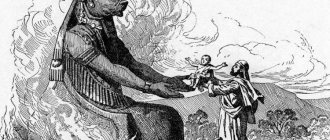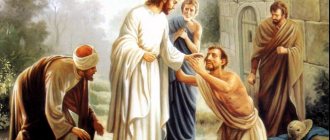How Jesus Christ became “God”
It is known that the word “lord” is an ancient Russian word and, at least in the 11th century, meant: ruler, head of the family, master; or it was simply a form of polite address to a person. You can find out more about this in the historical and etymological dictionary[130] (author - P. Ya Chernykh). Dahl writes the same thing, believing that this word in ancient times meant sovereign or master, but in Dahl’s modern understanding it was perceived by Christians as a synonym for the word “God.”
Those. the meaning of the word has changed:
· if in the distant past, when hearing the word “Lord”, a person had an image of a master, lord or sovereign,
· then subsequently the image of “God” began to appear, and “Lord Jesus” became identified with “God.”
How did they replace the meaning of the word “Lord” with the meaning of the word “God”? — In the Gospel of Luke (5:12) we read: “When Jesus was in a certain city, a man came covered with leprosy and, seeing Jesus, fell on his face, begging Him and saying: Lord! if you want, you can cleanse me.” In the Ostrog Bible there is a similar text.
It is quite appropriate here for the leper to address Jesus as a respected person, lord or even master. The difference is that the word Lord in the Synodal Bible is written with a capital (capital, large) letter, and in the Ostrog and Elizabethan Bibles - with a lowercase (small) letter. True, then it was customary to write everything in lowercase letters; the exception was the first letters with which chapters began - subsections of texts: in handwritten books they were each a work of artistic creativity of the scribes (hence their name in Russian - capital letters).
But nowhere in the New Testament is Christ called God, although he accepts addresses when he is called lord in accordance with the norms of politeness. If someone decided to call Christ God, what would he do? “And he would somehow change the meaning of the word “lord” from “master” to “God.” To reveal how this was done, let's look at where the word "Lord" first appears in the Bible. In the first chapter of Genesis, the Synod Bible uses only the word God. In the second chapter, beginning with the fourth verse, the word “Lord” appears before the word “God.” From this moment on, we encounter the phrase “Lord God”, or simply “Lord”.
The same phrase can be found in Western publications: in the Latin Vulgate, the German translation of Luther, the Polish translation. Another surprising thing is that Luther translated into German the Masoretic Bible, published by Gershom Soncino in 1494 in Hebrew, and already in this translation we encounter the words Gott Herr (Mr. God). In the Torah edition of Soncino[131] (1527), translated into Russian, there is no prefix “Lord” before the word “God,” although in another edition of the Torah, translated by David Josephon, this phrase appears as often as in Synodal Bible.
In the Ostrog Bible, the word “Lord” appears only 5 times in the second chapter. In the Elizabethan Bible - 7 times, in the Synodal Bible - 11 times.
You can find another explanation for the phrase “Lord God.” They say that this is a translation from the Hebrew "Adonai Elohim"
(see Tanakh - Yandex. Dictionaries). The word "Elohim" means Creator[132], but such an explanation does not fit with the New Testament.
Thus, the authors of the biblical project managed, without significantly changing the text of the New Testament, to change the meaning of some words and in this way make “Mr. Jesus” “Lord with a capital letter,” i.e. "By God."
Bart Ehrman
How Jesus became god
Dedicated to Cape
Bart D. Ehrman
How Jesus Became God: The Exaltation of a Jewish Preacher from Galilee
Translation from English by Svetlana Goryacheva
Binding design by Petra Petrovo
© 2014 by Bart D. Ehrman. All rights reserved Published by arrangement with HarperCollins Publishers
From the author
I would like to express my gratitude to the researchers who read a draft of this book and offered many helpful comments. The world would be a much happier place if each of us had such understanding and generous friends and colleagues. Among them are Maria Deurfler, a remarkable and broad-minded scholar who has just begun lecturing in church history at Duke University's Divinity Department; Joel Marcus, New Testament professor in the same department, who read my works repeatedly for 30 years, covering them in copious amounts of red ink; Dale Martin, professor of New Testament at Yale University, an old friend and colleague whose criticisms have helped shape me as a scholar for many years, and Michael Peppard, senior lecturer in New Testament at Fordham University, whom I have only recently met. He is the author of a book that I have cited many times during my research and which has had a significant influence on my way of thinking.
I also thank the entire NagregOpe
, especially Mark Tauber, publisher; Claudia Bautot, assistant publisher; Julia Baker, my talented and energetic literary agent, and, most of all, Roger Frith, my insightful and extremely capable editor, who helped me make the book better.
I dedicate this work to my wonderful and brilliant wife, Sarah Beckwith. I already dedicated one of my books to her years ago, but since I dedicate my entire life to her every day, I think now is the time to give her a new one. She is the most amazing person I know.
Preface
Jesus was a low-class Jewish preacher living in the depths of rural Galilee who was convicted of breaking the law and crucified for his crimes against the Roman state. However, soon after his death, his followers began to claim that Jesus was a divine being. They subsequently went even further, declaring that he was none other than God himself, the Creator of heaven and earth. How did the crucified peasant come to be thought of as the Lord, the beginning of all things? How did Jesus become God?
The irony of this question didn't occur to me until recently when I went for a long walk with one of my closest friends. As the conversation progressed, we discussed the usual topics: books we'd read, movies we'd seen, philosophies we'd pondered. Unlike me, my friend continued to consider herself a Christian. And then one day I asked her what exactly she considered the essence of her faith. Her answer made me stop and think. She said that for her, the core of religion was the idea that in Jesus God became man.
One of the reasons her answer took me by surprise was because it was once one of my beliefs, too—even though I had abandoned it years ago. As a high school student, I thought long and hard about this “mystery of faith,” as it is described, for example, in the Gospel of John: “In the beginning was the Word, and the Word was with God, and the Word was God... And the Word became flesh and dwelt among us, and we saw His glory, the glory as of the only begotten of the Father, full of grace and truth”1 (John 1:1-2, 14). Even earlier, I had openly and sincerely confessed the Christological statements of the Nicene Creed, where it is said about Christ:
I believe in... the Only Begotten Son of God, begotten of the Father before all ages, God from God, Light from Light, true God from true God, begotten, uncreated, consubstantial with the Father, through whom all things were created. For the sake of us, people, and for the sake of our salvation, He came from heaven and became incarnate from the Holy Spirit and the Virgin Mary and became Man.
However, I have changed over the years and now, having reached middle age, I no longer consider myself a believer. I am a historian of early Christianity who has spent nearly three decades studying the New Testament and the origins of the Christian religion from a historical perspective. And now the question that confronts me is, in some ways, the exact opposite of my friend's question. As a historian, I am no longer interested in the theological question of how God became man, but rather in the historical question of how man became God.
The New Testament says many times that Jesus is a man! How can he be God?
Of course, Jesus is a man. The Church firmly confesses this and, in its time, rejected heresies that denied the fullness of the humanity of Jesus. Jesus is fully and completely human, with a human body and soul, like us in everything except sin. The Church believes that our Lord Jesus Christ has two natures - He is both fully God and fully man.
As we have already said, the New Testament testifies to the Incarnation: “In the beginning was the Word, and the Word was with God, and the Word was God…. And the Word became flesh and dwelt among us” (John 1:1-14).
The book of Hebrews also speaks of the Son of God, who is expressly called God, “And of the Son, Thy throne, O God, is for ever and ever” (Heb. 1:8). And about how he took on “flesh and blood,” that is, he became a man for the sake of saving people: “And just as children partake of flesh and blood, He also took on them, so that by death he might deprive him of the power of him who had the power of death, that is, the devil” ( Hebrews 2:14).
Why is so little known about this period in the life of Jesus Christ?
Precisely because the apostles relied in this case on someone else’s material, and not on their own memories. In addition, the childhood of Jesus did not interest them in itself, but only to the extent that it highlighted the main idea of their writings: Jesus is the Son of God. Even the main period of the Savior’s life was not described in detail by the evangelists. The Apostle John directly testifies: Jesus did many other things; but if we were to write about this in detail, then I think that the world itself could not contain the books that would be written (John 21:25 ). We wrote down only the most important things. They did the same in this case.
Divine essence of the Savior
Photo: Stihi.ru
Theologians note that in reality this does not contain any contradictions. Christ speaks of his father as God, because he himself became incarnate, turning into an ordinary person in order to convey his teaching to one and all. The New Testament directly notes that he took on the form of a slave, took on human likeness, becoming indistinguishable from the most ordinary person.
After the Incarnation, Christ has two wills and two natures. The Savior decided to take upon himself all the sins of mankind in order to suffer for them even before his death. Therefore, it is completely logical that in such a situation he calls himself the Son of Man, and the Father - God. In particular, he emphasizes that he came to people not so that they would serve him, but so that they would have the opportunity to atone for their sins by starting life from scratch.
Maybe Jesus only looked like a child in appearance?
No, Jesus not only seemed like a child, but actually appeared to be one. From the very moment of His conception by the Holy Spirit, Jesus Christ was an absolute, one hundred percent man - despite the fact that he never ceased for a moment to be an absolute, perfect God. The Church suffered through this teaching in many years of disputes with the Monophysites, who believed that everything human in the Savior was, as it were, “dissolved” in His Divinity, like a drop of honey in the ocean. And it was approved in 451 by the decision of the IV Ecumenical Council.
From this decision it follows that the Lord Jesus, as in the popular expression, was not alien to anything human, with the exception of only one thing - sin. And infants don’t yet have any sins (they are born with a tendency to sin, but that’s a separate conversation). Therefore, it is difficult to find a reason why Christ should have avoided such a natural period of development for every person as infancy.
Back in the 4th century AD, Apollinaris, bishop of the Greek city of Laodicea (now located in Turkey), tried to reason like this: yes, Christ could have had a human body, but it is impossible to imagine that His mind was human. Where would that Divine wisdom, with which the entire Gospel is permeated, then come from in Him? How could human thoughts, if they were present in His consciousness, remain untainted by sin? No, the place of the human rational soul in Jesus was occupied by the Word of God, that is, God himself, Apollinaris believed. But this opinion was refuted back in 381 by the fathers who gathered at the Second Ecumenical Council. They countered Apollinaris' reasoning with a powerful argument: if Christ, God incarnate, had become like people in everything except the rational soul, then the rational soul of man would have remained outside of God and would have had no hope of being cleansed of sins and saved.
At every moment of His earthly life - and in His childhood years too - the Savior was an absolute, one hundred percent man. Both externally and internally. His connection with the Divine never disappeared, but was more subtle and incomprehensible than Apollinaris imagined.
How do we even know about the Savior’s childhood years? After all, then there were no apostles with Him yet.
The most natural assumption: His Mother, the Most Holy Theotokos, told the apostles about the most important events from the Savior’s childhood. There is not a single event in the “children’s” part of the Gospel that the Mother of Jesus could not know about. Joseph, by the time the Lord Jesus began to gather disciples, had most likely already passed into another world. And his sons from his first marriage - the same ones who are usually called “Jesus’ brothers” - could hardly have known, for example, the details of His Nativity, such as Joseph’s initial desire to part with the Virgin Mary after the news of Her pregnancy.
But the apostles communicated quite a lot with the Mother of God, especially after the Ascension of Jesus Christ, when the Virgin Mary lived in the house of the Apostle John. It is quite natural to assume that they questioned Mary a lot about her Son. And the most important things were subsequently written down.
Christ and the Scribes (copy from a lost original). Original author: Ribera, Jusepe de. 1591-1652
In the story of the Evangelist Luke about the Nativity of Christ and the appearance of the shepherds, there are wonderful lines: And all who heard were amazed at what the shepherds told them. But Mary kept all these words in her heart (Luke 2:18 , 19). And a little further, after the story of how twelve-year-old Jesus was lost in Jerusalem: And He went with them and came to Nazareth; and was in obedience to them. And His Mother kept all these words in Her heart (Luke 2:51 ). This is an indirect confirmation that it was the memories of the Blessed Virgin that formed the basis of the first chapters of the Gospel of Matthew and Luke (which precisely tell about the childhood of Jesus). Otherwise, why would the evangelist add these lines about His Mother?
The Incarnation of God the Word (+VIDEO)
Today is the feast of the Nativity of Christ. We are talking about this most important event in the history of mankind and its dogmatic significance with Candidate of Historical Sciences Pavel Vladimirovich Kuzenkov, a teacher at Sretensky Theological Seminary.
— Pavel Vladimirovich, what is the most convincing proof for you that Jesus Christ is God Incarnate?
— When the Lord began His sermon and His disciples followed Him, at some point He asked them: “Who do you say that I am?” Then Peter, on behalf of all the apostles, answered: “You are the Christ, the Son of the Living God.” That is, even Christ’s closest disciples did not immediately understand who was in front of them. That is why the Lord said to Peter: “Flesh and blood have not revealed this to you, but My Father who is in heaven.” The Lord considered it a special miracle that His own disciples saw in Him the Son of the Living God - the One Whom we now honor in Jesus Christ, i.e. Son of God, Second Person of the Holy Trinity.
Even for a person brought up on the Old Testament, which is full of prophetic predictions about the Incarnation, it was not easy to accept the news that the Son of God and God Himself would dwell with us, which happened on the day of the Nativity of Christ, when He was born of the Holy Spirit and the Virgin Mary and began to live among us. This is how difficult it was at that time for direct witnesses of these events to see the mystery of the Divine Incarnation. It is all the more difficult for us, people who are separated from this time by two thousand years and who, generally speaking, have lost the spiritual depth of perception of biblical texts, to see any evidence.
At the same time, the Lord loved man so much that he did not give him direct evidence of this truth. Remember how the Jews asked Him to do a sign for them from heaven? But this kind of proof would mean depriving a person of the most important thing - the gift of freedom. And the Lord requires from us a feat of faith and a feat of love. He demands from us that this is not obvious to us - and therefore not forced. What is obvious is forced, and there is no freedom of choice. That is why Christianity is called faith, and not knowledge about God, because it always remains unproven, non-obvious.
For me personally, evidence that Christ is the true God is His feat on the Cross
But for me personally, His feat on the Cross is not so much proof as evidence that Christ is the true God. Because an ordinary person would not be able to endure this kind of greatest service that Christ performed in the name of the human race. A service that was expressed in amazing words addressed to the Father: “If it is possible, let this cup pass from Me; however, not as I want, but as You want.” Through the sacrifice of the cross, the fate of the human race changed, history took a different path.
All this was unthinkable for the ancient consciousness. How is it: God dies, God sacrifices Himself, God suffers?
We come to spiritual perfection only through sacrifice and suffering
This was also unthinkable for the Jews, who saw in God the great and absolutely omnipotent Creator, Who cannot be subject to any violence. But for Christians and the Christian faith, this is the most visible proof that God became man, that God was resurrected, so that we all would be resurrected. This is the main meaning of Christianity - that man himself must become a god by grace. Therefore, the Divine nature of our Lord Jesus Christ is clearly visible precisely in the greatness of His suffering. For me, as a historian, this is also a kind of way of action for a Christian in such situations: we come to spiritual perfection only through sacrifice and suffering.
Pavel Kuzenkov. Photo: Pravoslavie.Ru
— At the same time, the Church was faced with the emergence of various heresies related to the union of two natures in Christ: Divine and human.
- This is one of the most amazing secrets of Divine Providence. Indeed, one can believe that Jesus Christ is the Son of the Living God. Moreover, it is directly written in the Scriptures. And Christ Himself in Scripture speaks about Himself in the words of Peter and approves of the words of Peter. But how to explain the combination of Divine and human nature? After all, according to ancient philosophy, God is an unchanging, immortal and completely impassive being. Man is mortal, changeable and subject to passions - and this is also a property of human nature. And if the Lord took on human flesh, it means that He took on human nature. How to combine these seemingly incompatible things? And on this basis some very beautiful logical constructions arose. Well, I’m not even talking about those early forms when movements arose that recognized and greatly revered Christ as a great Prophet and Teacher, but did not recognize his Divine nature. These, by the way, are Muslims who teach that Isa (Jesus) is the greatest Prophet, but Christians perverted the essence of His teaching, declaring Him God, introducing polytheism, and so on. That is, they stand guard over monotheism - truly the most important achievement of the Old Testament religion. It is very important to preserve monotheism. But how can it be combined with the presence of God the Father and God the Son? This already confused many in ancient times.
Someone was confused by the fact that the gospel words “In the beginning was the Word, and the Word was with God, and the Word was God” were very much reminiscent of philosophical concepts
Others were confused by the fact that the gospel words “In the beginning was the Word, and the Word was with God, and the Word was God” were very much reminiscent of philosophical concepts. Even a sect of “Alogs” arose, who considered the Gospel of John a fake and, accordingly, they rejected the teaching about the Word of God, about the Logos.
On the other hand, many went to the other extreme and believed that the Son of God and God are so united that, in principle, there is no difference between Them, that they are simply different manifestations of the One and the Same Person as certain avatars. That is, God can turn to a person in different directions, but he is, nevertheless, a single Person.
To get out of all these intricacies, it took colossal intellectual intensity work of the Holy Fathers - the greatest minds of antiquity. The peak of this entire Christological discussion, as it is called, came at the end of the 4th - 5th centuries. And ultimately, the Church developed the only correct doctrine about God from all points of view, which bypasses the flaws of all other concepts.
Here we must keep in mind that Christianity does not claim to know about God. The mystery of the Divine Trinity, the mystery of the Incarnation are incomprehensible to the human mind. When we talk about the teaching of the Church, we are talking specifically about a belief system that rejects false teaching. That is, in essence, Christian theology is always apophatic, it always cuts off false speculations so that a person does not fall into error. Therefore, sometimes one hears that Christian theology is unprovable. As I already said, one can only believe in God; He cannot be known in a fallen state. But you can believe truly, or you can believe falsely. That is, opinions about God can be false. And in fact, the concept of “Orthodoxy” (“Orthodoxy”) consists precisely in the fact that a person holds a true opinion about God.
Christianity teaches that the Lord Jesus Christ is true God and true man
Christian dogma teaches that the Lord Jesus Christ is true God and true man. That two natures in Him were united in such a way that they did not form a third nature, that they did not merge, but cannot be separated, that they were united in an immutable way and can no longer be separated, and that during their union they did not change each other . Human nature was not subordinated to the Divine, the Divine nature did not undergo changes from the union with the human. These things are difficult to understand, but all other options are dogmatically flawed, because they imply the falsity of our hopes for salvation.
Suppose we followed the heresy of Nestorius. Nestorius taught that Jesus Christ is the union of the man Jesus and God the Word. From this union came a certain new Person, a Unity Person, which he called Christ. That is, God the Word and the man Jesus formed Christ. And therefore Mary is the Mother of the man Jesus. God the Father is the Father of God the Son, and Christ was born of Mary, and in this sense Mary can be called the Mother of Christ. But in no case can she be called the Mother of God, because the Son of God was born from the Father before all ages. If we follow this teaching, it turns out that the union of Jesus and God the Word was, although miraculous, instantaneous. He was honored, as Nestorius taught, only by the greatest sinless righteous man, Jesus, who was chosen for such an amazing sacrament. What about us? How is our nature saved? And it turns out that if this connection was only a connection at the level of Persons and there was no connection of natures, then it turns out that human nature is not saved.
On the opposite side stands the teaching of Eutychus (or, as it is sometimes called, Eutyches) Monophysitism. Eutychus taught that the union of natures in Christ led to the creation of a single nature. That it turned out to be so close that humanity and Divinity merged into one. And it is clear that they merged into the Divine nature, because the Divinity is higher than humanity. But, based on this concept, it turns out that humanity is diminished during deification and a change in human nature occurs. She finds herself, as it were, involved in the Divine. And the most flawed content of this teaching is that the suffering of Christ in this situation is the suffering of God, who is not subject to suffering. Hence the consequence of Eutychianism is aphthartodocetism. People who professed this doctrine believed that Christ’s suffering on the cross was imaginary, because the Lord God does not suffer. But this entailed very dangerous consequences. After all, then there was a feeling of a certain illusion and theatricality of all the events that took place in the Gospel and described in the New Testament. And of course, from a dogmatic point of view, this is an unacceptable construction.
Therefore, only the Orthodox definition remains, developed at the IV Ecumenical Council in Chalcedon, according to which the Church teaches us, and we already confess, that Divinity and humanity - two natures - were united in Christ in one Person. Moreover, this connection did not lead either to the emergence of a special unified nature, or to the appearance of a single Person. That is, in Christ Jesus there is no separate man and no separate God. And the Person - if you like, the subject of this connection - is the Second Person of the Most Holy Trinity. As it is actually written in the Creed: “[I believe] in the One Lord Jesus Christ, the Son of God, the only begotten of the Father, ... for our sake man and for our salvation ... Incarnate of the Holy Spirit and the Virgin Mary.” That is, this is the very Son of God, Who was born before all ages from the Father, and He was born in time from the Mother of God. And this is the very teaching that allows us to call the Virgin Mary the Mother of God. And it is this teaching, quite complex from the point of view of some philosophy, but invulnerable from the point of view of dogmatic consequences, that is considered Orthodox.
Father Georgy Florovsky has interesting analogies with our time: he calls Nestorianism anthropological maximalism, and Eutychianism anthropological minimalism. And in this sense, Western Christianity, especially the Christianity of modern times, humanistic, which places man and the human principle too highly in the Lord, is similar to Nestorianism. By the way, this is where the Catholic specificity of the depiction of the Crucifixion comes from, in which the Lord is necessarily depicted crouched in agony. While for the East, according to this analogy, exaggerated attention to the Divine principle in Christ is more typical - hence the iconic image of Christ, the impassive God, characteristic of Eastern Christianity. Of course, this is just a play on certain meanings, although the fashion that appeared in Europe for Nestorianism at the beginning of the 20th century shows that there is something in this concept... In general, exaggerated attention to the human principle, human freedom, of course, takes place in the entire Western civilization, which we call humanistic civilization. At the same time, at some point, exaggerated attention to the human actually leads to the fact that this civilization ceases to be Christian, and man not only reaches the level of God, he takes the place of God.
Monophysites have another tendency - a tendency to belittle humanity, and this tendency in its highest form is manifested in religions of a fatalistic nature, when nothing depends on man - everything is in the will of God.
Orthodox Christianity avoids both extremes: it preserves both the height of humanity and its proper place.
— Some associate the holiday of the Nativity of Christ with the expectation of miraculous changes in their lives. Where does it come from?
— The holiday of the Nativity of Christ is a celebration of a certain renewal, a new life cycle, the beginning of a new, better life. The Nativity of the Savior marked this beginning for all humanity, while each of us annually associates a certain turning point in our own lives with this Holiday. This, of course, is a purely symbolic phenomenon, because the Lord does not perform miracles according to the calendar.
It is important for us that both on the day of the Holiday and during the Nativity Fast we turn to God with prayers much more often
However, it is important for us that both on this holiday and during the Nativity Fast we turn to God with prayers much more often than usual. At this time, communication between man and God is closer, more intense - and the Lord responds to our calls. The most important thing in your prayers and in your desire to change your life for the better is to maintain two things: complete trust in God (if something is not given to you by the will of God, then it is better for you) and to avoid pride when the Lord answers your prayers and gives you what you ask for.
—Has it ever happened in your life that the Lord responded to prayers?
- Yes, such events have happened in my life. Once it was about the illness of a person close to me, whose life was literally hanging in the balance, so there were no objective reasons for things to get better. The only hope left is in the Lord. I didn't promise anything to God. Do you know the story of how Martin Luther promised during a thunderstorm: “If You save me from a lightning strike, I will become a monk”? We know how it all ended: he became a monk, but only then destroyed the Catholic Church from the inside. Such vows are very dangerous, they are unbearable burdens. A person cannot play such a trade with God: I - for You, You - for me. Why is this? God needs nothing from us except love. Therefore, I asked for what is called free of charge, without promising anything. But he asked, as it seemed to me, sincerely. And indeed, everything went very well: this man is now alive and well.
— What could you wish our readers on the occasion of the Nativity of Christ?
There were few joyful days in the earthly life of the Lord, but it all ended with the bright Resurrection
— Dear friends, on these joyful days, happy days of the Christmas holiday, I would like to wish you and all of us, first of all, strength in faith. Because it is this fortress that helps us overcome any adversity, helps us to rejoice in our earthly joys and helps us not to fall into any despondency or sorrow during all kinds of troubles that are inevitable on our way. The Nativity of Christ reminds us of the earthly life of the Lord Himself, in which there were quite a few joyful days, there were many injustices, there was a lot of grief, there was betrayal - probably the worst thing that can befall a person. But it all ended not with terrible torture and execution on the Cross, but with the bright Resurrection. So for us, Christmas is a memory not only of the beginning, but also of how the life of a Christian ends. It ends with the resurrection from the dead, the life of the next century, the new birth. And earthly Christmas entails heavenly Christmas. I would like to wish all of us to always remember this.
Or maybe God united with Jesus later, when He grew up and matured?
No, the teaching of the Orthodox Church unequivocally states that the man Jesus Christ was and remains God from the very moment he was conceived by the Virgin Mary. God never “joined” Jesus, Jesus is simply God from the beginning, the same Person.
Christ the Blesser. Emile Mounier
At the beginning of the 5th century, a large-scale dispute broke out in the Church on precisely this topic: how does the Son of God, the second Person of the Holy Trinity, relate to Jesus of Nazareth? The Patriarch of Constantinople Nestorius propagated the doctrine according to which the man Jesus Christ and the Divine Logos (the Word of God, or the Son of God), although united with each other through a certain “Person of Unity,” are essentially two different persons. For this reason, Nestorius forbade calling the Virgin Mary the Mother of God: She gave birth not to God, but to the man Jesus Christ, into whom at some point, after His birth, the Divine Logos indwelled, Nestorius insisted. This means that it is appropriate to call Her the Mother of Christ.
But at the Third Ecumenical Council, held in 431 in the city of Ephesus (now the territory of Turkey), Nestorius’s way of thinking was recognized as heretical. The greatest contribution to the victory over Nestorianism was made by St. Cyril, Patriarch of Alexandria (ǂ 444). It was on his initiative that the Ecumenical Council was convened, and it was Saint Cyril who formulated one of the most important dogmatic truths of Christianity, which in modern language can be expressed as follows: The Lord Jesus Christ is the true God and the true Man in one person, this is a single Theanthropic Person. Therefore, it is impossible to talk about the “inhabitation” of God in Jesus at some point in His earthly life.









